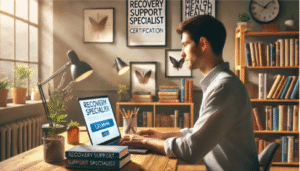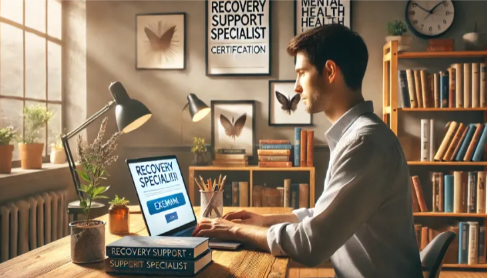Empower Recovery: Your Ultimate CRSS Exam Success Blueprint
Empower Recovery Your Ultimate CRSS Exam Success Blueprint. For people negotiating the road to mental health recovery, the Certified Recovery Support Specialist certificate is a lighthouse of hope, advocacy, and transformation.
It honors those who have experienced mental health or drug use issues personally and who are dedicated to helping others on their own paths of recovery.

Acknowledging the CRSS Function
Fundamentally, the CRSS title recognizes that lived experience is a tool rather than a hindrance. Certified Recovery Support Specialists provide empathy, advocacy, and useful advice to people now battling by sharing their own paths to recovery.
Important obligations comprise:
- Helping peers create action plans and recovery objectives.
- Encouragement of resilience and wellness
- Furnishing tools and referrals for healthcare, employment, and housing.
- Encouraging self-advocacy and emancipation
- Working with therapy teams and maintaining ethical limits
Getting ready for the CRSS Examinace
Preparation is about matching your own experience with professional information, not about memorizing. Here’s a methodical way you might get ready:
Recognize the Exam Structure
Learn the passing score, time allowed, and amount of questions. Most CRSS tests cover all competency categories and are multiple choice.
Review the Candidate Guide second step.
Most certifying authorities release a guide detailing the subjects of the test. Your studies will find direction from this route map.
Grab a CRSS Practice Test.
A crss practice exam is among the best tools available for determining your preparedness. These practice exams expose which subjects demand more focus and help to replicate the real test experience.
Make use of several study materials.
Add handbooks, ethics codes, study guides, and training courses. With an eye toward:
- Practices geared toward recovery
- Peer support ranges.
- Systems of advocacy for crisis navigation
- See also artificial intelligence for software testing using smart test orchestration, self-healing scripts, and
- AI-powered defect analysis.
Set out weekly study time. Deepening your knowledge will come from group study sessions, flashcards, and journaling on your experiences.
The Value of CRSS Certification
The CRSS accreditation guarantees a strong personal dedication to service and development, so offering more than just professional recognition. The certification is extremely significant for the following reasons:
Verification of Knowledge
The CRSS path respects your personal experiences as legitimate credentials. It links intentional, professional service with personal recovery.
Improved Employment Prospectures
Certified experts are sought for in many different environments, including:
- Centers of behavioral health
- Peer-led companies
- Teams for crisis response
- Local clinics and hospitals
Enhanced Peer Support System
Certification links you to a larger community of advocates and experts passionate about recovery-oriented treatment.
Advantages comprise
- Knowledge of Question Formats: Recognize the true meaning of the questions and their wordings.
- Reducing nervousness by simulating the test surroundings helps one develop confidence.
Core Skills of the CRSS
The CRSS test evaluates your knowledge and abilities in numerous important areas, each intended to reflect the actual duties of peer support work. These usually consist of:
One is advocacy.
Advocating peer rights, negotiating systems of care, and advancing justice and equality.
Teaching and Guidance
Appropriate sharing of your recovery narrative, supporting others in discovering their own strengths, and providing instructional materials.
Helper for Recovery
Encouragement, facilitation of wellness planning, and modeling of recovery values.
Moral Obligation
keeping ethical behavior, secrecy, and professional limits in every peer interaction.
Every one of these areas is quite important for the recovery support system.
- The opportunities are as varied and as satisfying.
- Professionals Possibilities.
- Specialist in peer support.
- Coordinator of mental health outreach.
- Residential recovery agent.
- Assistant for crisis intervention.
- Coordinator of wellness.
Ongoing learning
Maintaining certification sometimes calls for continuous learning. This guarantees that you are current with the most recent advances in trauma-informed care, ethics, and peer support best practices.
